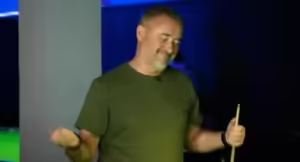Is it okay to use a pyrotechnic in a football stadium when you’re standing right next to another fan and it may burn at over 1,000 degrees Celsius?
Unsurprisingly, the response is a “unequivocal” nay. That’s based on an independent analysis that Uefa ordered back in 2017.
The bad news for Scotland’s football officials, however, is that this does not mean they can just close their eyes and assume that a problem that is becoming worse would magically disappear, much like colorful smoke from a canister.
Six years ago, more than 25% of Uefa matches were reported to have used fireworks. That number has undoubtedly increased, as anyone who follows European football even slightly will attest, and Scotland is squarely in that group.
Therefore, whether you support it or not, it’s probably best to accept that smoke bombs, flares, and pyrotechnics will never go away. But is there a way to stop them?
Dr. Tom Smith, the author of the Uefa research, tells BBC Scotland that education is the solution. “My worry, but also part of the solution, is I don’t think fans understand what the problems are because they can convince themselves that they’ve never had a problem.”
On The Scottish Football Show, Tommy Corsden, the creator of Tifontaine, the first safety-approved portable flare in the EU, goes into great detail about why he thinks his lower-temperature pyro can reduce risk rather than hopelessly trying to eliminate it.
“It’s important that the debate goes on,” he continues. “The issues won’t get better. They must come up with a fix.”
‘Escalating’ issue not being addressed by authorities
The pyro problem in Scottish football is getting out of hand, if it hasn’t already. A new law that made it illegal to own flares and fireworks inside stadiums went into effect in June, following the postponement of Celtic vs. Rangers’ Scottish Cup semifinal match in May due to smoke inside Hampden.
Minister of community safety Siobhian Brown stated at the time that the measures were intended to address the “escalating” and “dangerous” issue. That tackle has been more of a weak tug on the shirt than a two-footed cruncher.
BBC Scotland discovered earlier this month that the SPFL has never sanctioned a Scottish club for using flares or fireworks.
That occurred shortly after the Premiership match between Rangers and Dundee was postponed for eighteen minutes due to a full stand demonstration by the visiting supporters that filled Dens Park with smoke and set off a fire alarm.
Is it really such a spectacle? Most likely not, but considering that traffic had already caused a 45-minute delay for the event, safety concerns and general inconvenience must also be taken into consideration.
When the Scottish FA and SPFL met this week to consider their future actions, that night at Dens Park would have been high on the agenda. Representatives from the Scottish government and Police Scotland were also in attendance. Fan representation was nonexistent.
It could be a good idea to have some long overdue discussion with fans, especially in light of the growing number of supporters who are eager to keep using Pyro and those who have legitimate worries.
Why it is impractical to solve the issue
Clubs will unavoidably face increased pressure to take action as the issue worsens. However, following their meeting in Hampden, the SFA and SPFL said they are initially heartened by the measures taken to address the problem.
A few days after the authorities had agreed to implement a “range of steps” to prevent a repeat of the Dens show, Motherwell’s supporters lit up the away end at McDiarmid Park in St Johnstone, raising the possibility that they “could be subject to sanctions”.
However, it may be unrealistic to think that club declarations would enough to solve the issue, so perhaps we can anticipate the term “strict liability” being used again soon.
In an attempt to address fan misbehavior, the notion of implementing such technique was proposed in 2019. However, according to a BBC Scotland survey, only three SPFL clubs supported holding their supporters accountable for their activities.
Uefa uses this tactic in their European competitions, but it doesn’t seem like it’s making much of a difference, despite numerous fines being handed out to clubs all over the continent, including Scottish teams.
Smith feels that the best approach to avoid pyro is to “stop it being imported” into the nation, but he “wouldn’t be in favour of draconian searches” outside of the grounds. He continues, “But that’s not easy.” Rather, he would prefer that the hazards be highlighted.
“The people using them need to know the danger,” he states. “It is one thing to take care of yourself; it is quite another to start endangering other people.
If you conduct a fast search on YouTube, numerous incidents will come up. A French steward lost a portion of her foot, a Croatian firefighter lost three fingers, and a spectator who was picking up a pyro lost most of his hand when it detonated.”
Is a middle ground possible?
Since there is already legislation in place, it is difficult to foresee if further rules or sanctions would stop a spiraling problem. Therefore, rather than expecting it would go away, perhaps there might be a conversation about minimizing risk.
With his invention, a lower-temperature pyro that burns at a temperature roughly four times lower than an emergency flare, Corsden thinks he can accomplish it.
Although they can still reach a temperature of 250C, the Dane emphasizes that this is not something to play around with and that the device is “much less dangerous” thanks to a heat-resistant grip and simple extinguishing mechanism.
The presenter is shown in a video from COPA90 passing the flame over his head and through his palm. In addition, significantly less smoke is released and the flame is much smaller than that of a typical flare, but that still doesn’t solve the problem of close proximity.
Orlando City, an MLS team, has introduced designated smoke device zones to their standing section in an attempt to address that.
As the Swedes and Danes have discovered, it is challenging to authorize and regulate such actions. The fans of Brondby in Denmark stopped the implementation of Tifontaine since each game needed permission from the local municipality.
More than a thousand devices were purchased by Sweden as well, but authorities allegedly interfered to stop the sale from proceeding.
It’s unclear if the two countries will try to complete their product testing, but one thing is certain: Pyro is here to stay.
Whether you like it or not, until agreements are reached or concessions are achieved, you should expect to continue to observe illegal smoking in your preferred Scottish location.








